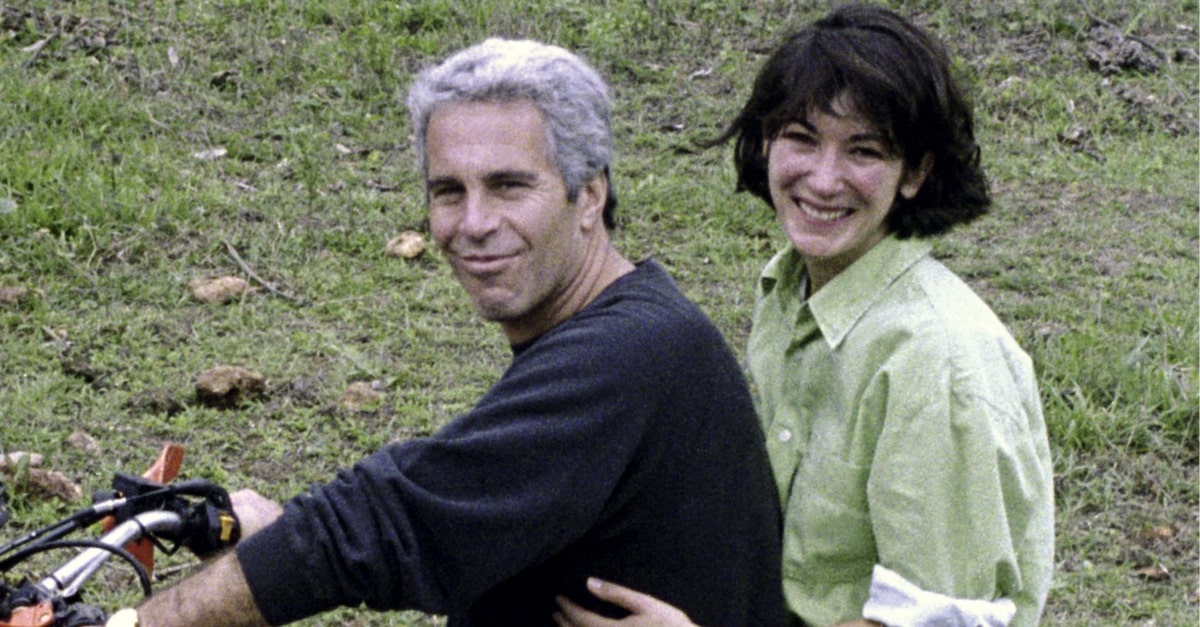
Prosecutors said that they found this photograph of Jeffrey Epstein and Ghislaine Maxwell during the 2019 raid on Epstein’s New York townhouse.
On the sixth day of their deliberations, jurors mulling the fate of Jeffrey Epstein’s accused accomplice Ghislaine Maxwell requested testimony by defense witnesses for the first time.
The jury also asked about the scope of presiding U.S. District Judge Alison Nathan’s instruction that they will work every day until they reach a verdict.
“Every Day, Going Forward”
The panel of 12 diverse men and women wondered whether that meant they could be spending New Year’s Eve and New Year’s Day inside the Thurgood Marshall U.S. Courthouse in lower Manhattan.
Judge Nathan made clear that they might.
“Yes, you will continue deliberations as needed, every day, going forward,” Nathan said, adding this would include the New Year’s holidays and the Sunday immediately following it.
The jurors can inform the court whether this instruction poses a “substantial hardship” for them because of unmovable conflicts.
Late afternoon on Tuesday, the judge indicated that she would urge daily deliberations until verdict time because of an “astronomical spike” in COVID-19 cases, as the omicron variant ravages through New York City, where the trial is taking place.
“We are, very simply, at a vastly different place regarding the pandemic than we were only a week ago,” Nathan said on Tuesday. “We now face a high and daily escalating risk that jurors and/or necessary trial participants would need to quarantine, thus disrupting trial and putting at risk our ability to complete this trial. Put simply, I conclude that proceeding this way is the best chance to both give the jury as much time as they need and to avoid a mistrial as a result of the omicron variant.”
Ex-federal prosecutor Mitch Epner, who led intake on sex trafficking cases in the District of New Jersey in 2003 and 2004, told Law&Crime that instruction could speed up the verdict.
“While you never know what a jury will do or when they will do it, Judge Nathan’s informing the jury that they will deliberate ‘every day’ until verdict (including New Year’s Eve) likely will increase the peer pressure among the jurors to get to a verdict quickly,” noted Epner, who is now of counsel with the firm Rottenberg Lipman Rich PC.
Before the COVID scare, Judge Nathan initial told jurors court would be adjourned on Thursday, Friday and the weekend.
“Take All the Time You Need”
Pressed by defense attorneys to clarify she is not rushing them toward a verdict, Nathan has told jurors: “You should take all the time that you need.”
Jurors appear to be taking that remark to heart.
Deliberations barely had begun on Wednesday when jurors sent a note requesting transcripts from five additional witnesses: Cimberly Espinosa, a former executive assistant at J. Epstein & Company; ex-FBI agents Amanda Young and Jason Richards; defense expert Elizabeth Loftus, who previously consulted with or testified for O.J. Simpson, Harvey Weinstein, Robert Durst, and hundreds of other defendants; and Shawn, the ex-boyfriend of the Maxwell accuser testifying only as Carolyn.
All of those witnesses but Shawn had been called by the defense.
Jurors previously focused on eight witnesses called by the prosecution, including all four of Maxwell’s accusers: “Jane,” “Kate,” Carolyn and Annie Farmer; Epstein’s ex-pilot David Rodgers; Epstein’s former house manager Juan Alessi; and retired law enforcement officer Gregory Parkinson, who participated in the 2005 search of Epstein’s home.
Those 13 requested transcripts represent more than a third of the 33 total witnesses who testified, broken down into 24 for the government and nine were called for the defense.
There is good reason for Nathan to clarify that the new deliberation schedule is not meant to be coercive: Too much pressure could arm Maxwell with an appeal, if she is convict, ex-Southern District of New York prosecutor Richard Signorelli said in a phone interview.
“She’s got to make it clear to the jury that they should not feel rushed, or pressured in any way to reach a verdict,” Signorelli told Law&Crime. “And if she emphasizes those types of things, it’s less likely that an issue would be created on appeal for the defense in the event there was a conviction.”
Legal experts agreed that Nathan appears to have navigated those concerns well. Epner said that the judge does not appear to be close to the line of creating an appellate issue, and Signorelli praised Nathan as a “very good trial judge.”
“I think she’s aware of that,” Signorelli said. “I think she’s saying the right things.”
The jury also has queried Judge Nathan about fine points of law about the elements of at least four of the six charges against Maxwell, who has been accused of enticing minors for Epstein’s predation and allegedly engaging in sex trafficking.
If convicted on all charges, Maxwell—who turned 60 on Christmas Day—could effectively spend the rest of her life in prison if dealt the maximum sentence.
(Photo via DOJ)